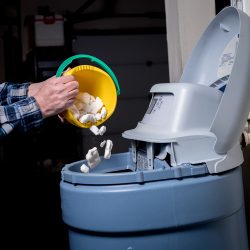The Pros And Cons Of Water Softeners
April 13, 2023 10:52 pm Leave your thoughts The Pros And Cons Of Water Softeners
The Pros And Cons Of Water Softeners
A water softener removes minerals that cause hardness in the water supply. These minerals include calcium and magnesium. The resulting water is soft and easy to rinse away. This makes it ideal for washing your hair and skin, as it leaves a gentle, silky feeling behind.
Cost
Water softeners are a cost-effective solution for tackling hard water problems around the house. They prevent the buildup of scale and scum that clog pipes, appliances, and kitchenware. They also help prevent the growth of bacteria in your water supply, which can lead to unpleasant health effects. The cost of a water softener can vary depending on the size of your home and what type of softener you choose. Generally, larger homes use more water and require a larger water softener. The price of water softeners also varies by brand and model, so it’s important to do your research before making a final decision. The first step is to get a water test from your local municipality or an expert near you.
Efficiency
Softeners work by exposing an ion exchange resin to a salt brine solution, which contains sodium chloride and hardness ions like calcium and magnesium. These ions are removed by the resin and replaced with sodium ions, which make the water soft. Brine concentration is also an important factor. Brine efficiency is a key component in water softener performance, as it can significantly affect system costs and environmental impact. Generally, upflow systems are more efficient than downflow as they tend to regenerate on average with less water use per regeneration.
Installation
Most water softeners include two tanks — a mineral tank that contains plastic resin beads that capture hard minerals, and a brine tank that periodically pumps a salt or potassium chloride solution through the mineral tank to wash the beads. The tanks need to be installed side-by-side, near an electrical outlet and within reach of a drain. If you’re installing a water softener for the first time, you may want to hire a professional. It’s an important job, and mistakes can lead to costly repairs or replacement parts. Where you live and the type of water you use can also influence your installation costs. Urban and metropolitan areas often have higher costs for materials and labor than rural regions.
Maintenance
Water softeners are low-maintenance appliances. They need to be recharged and cleaned at least once a year, though the frequency of these tasks depends on your water quality and how much you use the system. For instance, if you have hard water, it may foul and degrade the resin beads, which require periodic cleaning. Similarly, if the brine tank becomes clogged with sand or sediment, regular backwashing can remove this debris. If your water is too turbid or contains too much iron or chlorine, these contaminants can also clog the resin beads. This can cause the system to malfunction, so it’s important to regularly clean the resin tank!
Categorised in: Water Softener
This post was written by admin

 The Pros And Cons Of Water Softeners
The Pros And Cons Of Water Softeners